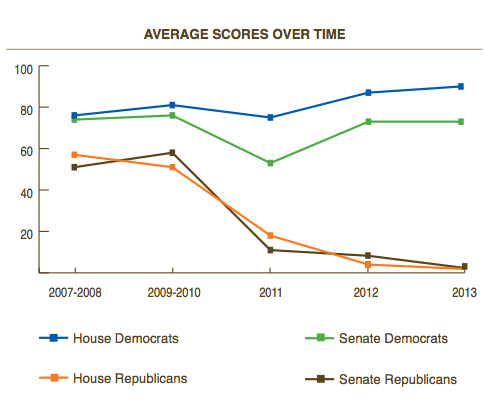NC lawmakers earn record low grades on the environment

The North Carolina General Assembly drew national attention this year for its aggressive efforts to reverse progress on civil rights, tax fairness, and social safety net programs.
It turns out the 2013 legislative session was also an unprecedented disaster for the state's environment.
A record number of lawmakers in the Republican supermajority-controlled legislature earned zero scores on the annual report card issued by the N.C. League of Conservation Voters. Among the pieces of legislation considered were bills to speed the state's move to fracking, limit local control over air and water protections, and dissolve or restructure various environmental oversight boards.
"This year has been one of heartbreak in the environmental community," wrote NCLCV President Maria Kingery in a letter accompanying the scorecard.
From 1999 through 2012, NCLCV handed out a total of 48 zeros to state lawmakers. But this year alone, it gave zeros to 82 lawmakers, while an additional 25 scored in the single digits on a scale of zero to 100.
In the House, the average score was 34, slipping from 42 last year. The Senate's average score was 28, down from 35 in 2012. This year's average score was boosted by the 26 House members and one Senator who scored a perfect 100 -- all of them Democrats.
Indeed, the scorecard found an ongoing trend of partisan polarization on the environment, with the gap between Republican and Democratic averages at an all-time high. The Senate had a gap of 69 points between average scores by party, with Republicans scoring a 4 and Democrats a 73. The partisan gap was even bigger on the House side, with Republicans scoring an average of 4 and Democrats an 87.
As recently as the 2007 and 2008 sessions, there was a gap of only about 20 points between the parties. Though the NCLCV report does not offer an explanation for the widening party divide, the redistricting that followed the 2010 Census was a likely factor, with members of both parties placed in partisan-advantaged districts that reduce electoral competition.
The NCLCV scorecard also evaluated the governor for the first time, using a letter scale of A to F. Gov. Pat McCrory (R) got a failing F on his budget but a D- overall, boosted by his support for renewable energy resources like solar and offshore wind power.
Tourism-dependent North Carolina had long been a leader on the environment, with its careful regulatory approach putting the state at the top of various rankings for best places to live and do business. But NCLCV notes that the regressive legislative turn appears to be taking a toll on the state's image, with North Carolina dropping from fourth to 12th in a recent CNBC ranking of "America's Top States for Business." The score that dragged down the state's rating was quality of life, which includes environmental quality.
"It is easy to be overwhelmed by these numbers," the NCLCV report concludes, "but we have a chance to improve them, as elections are right around the corner."
Tags
Sue Sturgis
Sue is the former editorial director of Facing South and the Institute for Southern Studies.
